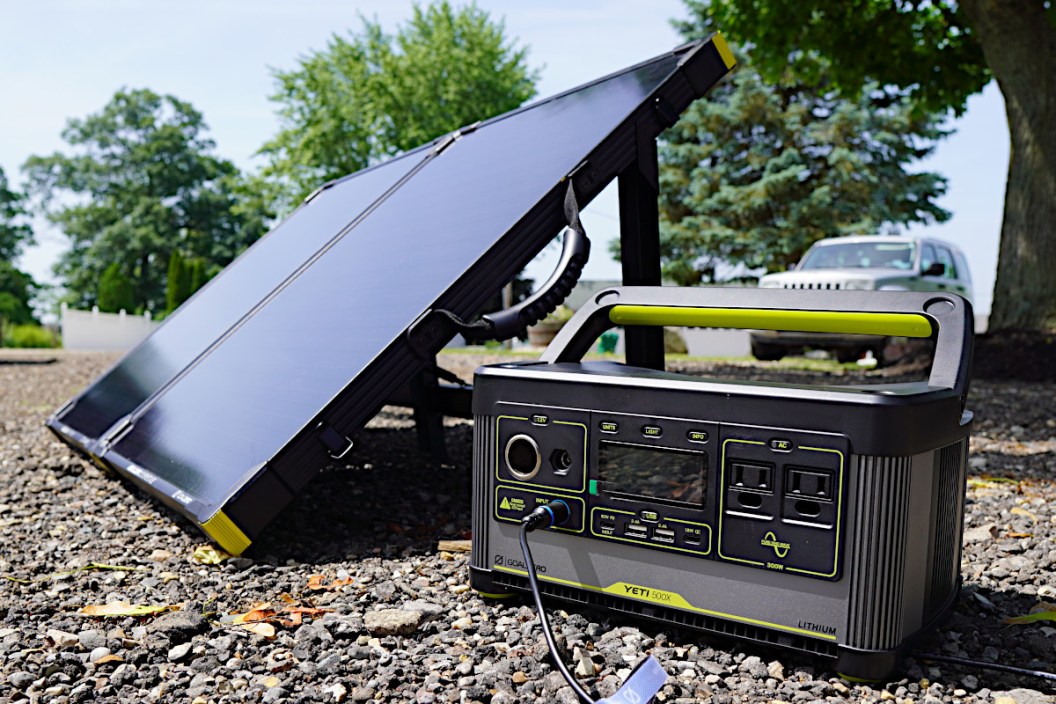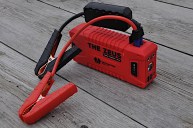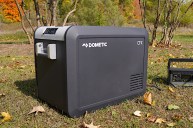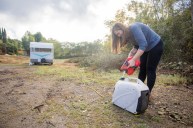As much as we enjoy getting away from it all in the beauty of nature, sometimes we need modern technology to keep our gear charged when we're off the grid. That's what led me to purchase a portable power station and solar panel earlier this year. My goal is to spend less time in the home office, and more time camping and on the road this summer. I knew I was going to need something to keep my laptop going while I did it. I ended up picking up the Goal Zero Yeti 500x and the Goal Zero Boulder 100 solar panel a few months later for exactly that purpose. They have performed perfectly for the task of keeping me online even when away from the home office, but more importantly than that, the power station has pretty much become my one-stop charging solution for all my electronics in the months since my purchase. I'm not sure I'm ready to go one hundred percent off-grid, but if I needed to, I now know it's possible thanks to these devices. This is my experience from using these two Yeti products the last four months, and how they are going to be a huge part of my outdoor adventures going forward for camping trips and so much more.
Quick Specs of the Yeti 500x
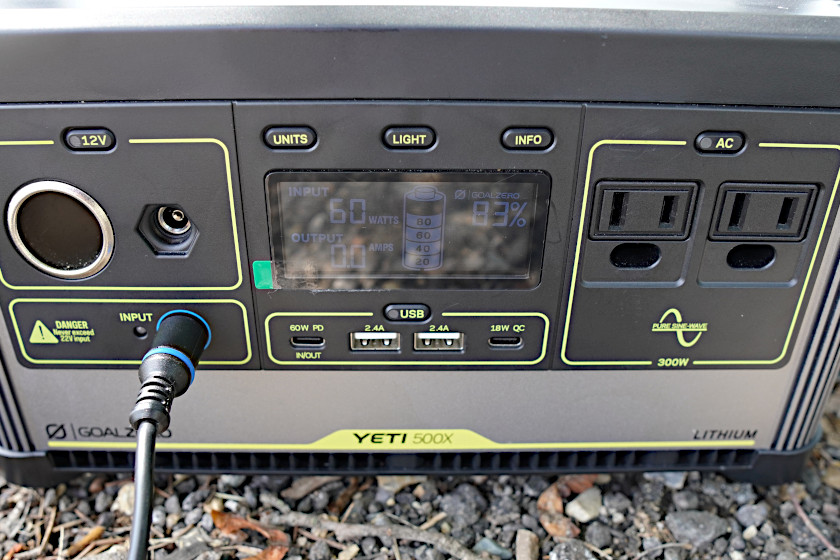
Travis Smola
As the number indicates, this power station is a 500-watt unit and it's essentially a giant lithium battery that's equipped with two AC ports, a 12-volt car port, two USB-A ports, a USB-C port, and a USB-C PD port. That gives me the option to charge every piece of electronic equipment I own from my cell phone to my laptop and even my drone with a single device. Goal Zero includes a 60-watt AC wall charger in the box, so you can keep this thing's battery capacity up when you are in the home. In fact, the company recommends keeping it plugged in while at home to avoid losing a charge for emergencies.
One thing I really appreciate about this device is just how compact it is. It's only about 12 by 14 by 9 inches and comes in at a little under 13 pounds. It easily stows away in my Jeep for transport and will fit into most RV storage areas for longer camping trips. The carrying handle on top makes moving it around a breeze.
How Long Does a Yeti 500x Last?
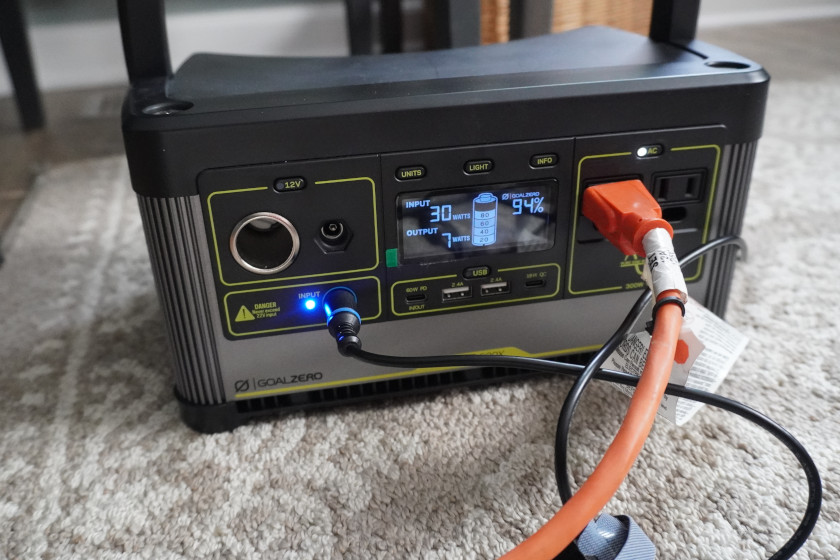
Travis Smola
Since I bought this device primarily with remote work in mind, it's seen extensive testing using my 17-inch laptop. If I leave the laptop plugged into it all day on full screen brightness, with no other power being put back in, it drains the lithium-ion battery down to about 65 percent over a standard eight-hour day. So, I could technically get about two and a half days of work out of a single charge. If you're using a smaller laptop, expect to get more time than that.
I've found by turning down the screen brightness and disconnecting the laptop when it is fully charged, I can goose the power drain so there's around 75 percent left at the end of the day. Not bad at all for a laptop that's traditionally a battery hog. It's easy to monitor where your battery is at too thanks to the big LCD screen on the front that features two indicators for power. It also includes information on how much power is being input and how much is being output for the device, which comes in handy while using a solar panel. I'll share more on that in a bit. A quick press of the unit's button can change the indicator between amps, watts, watt hours, and volts, depending on your preference. It's an easy-to-understand management system, and you don't need to be an electrician to decipher what it all means.
Smaller devices like cell phones and cameras used such an insignificant amount of power that I'd imagine you could easily go a week or more between charges if those are the only electronics you're powering.
In the end, I'm inclined to believe most of Goal Zero's advertised charge times, if only because they were spot on for the items I tested. For instance, two major items many campers apply power banks to are portable fridges and CPAP medical devices. Goal Zero says you can expect eight hours of use from a 65-watt CPAP and 20 hours with a 25-watt fridge. The company says you can get about ten charges of a laptop from a fully charged 500x, and that's about what I experienced with mine in extensive testing.
In fact, the 500x far exceeded my expectations in most cases. During one stint, a bad spring storm blew through my part of southwest Michigan, knocking out the power for more than 12 hours. I was able to use the Goal Zero to power up my Wi-Fi router and laptop the next morning. As a result, I didn't fall behind in my work in a critical week before a big media trip. When used in conjunction with a solar panel that's getting peak sunlight, you can keep the battery topped off almost all day while using only a few devices. Thanks to this setup, I feel fully confident I could go one hundred percent digital nomad in a travel van if I really wanted.
The Goal Zero Boulder 100 Briefcase
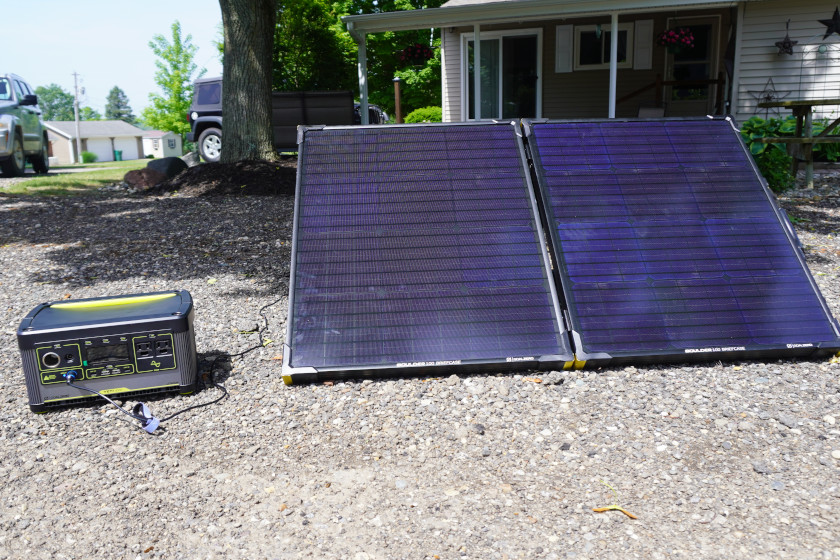
Travis Smola
Most people who are looking at power stations are likely going to look for a solar charge solution, too. My goal was to take my work completely off-grid so I could boondock or stay in dispersed camping sites for free while on the road. I ended up picking up the Boulder 100 Briefcase Solar Panel a few months after getting the power station to make the most of Goal Zero's gear. It's a 100-watt monocrystalline panel system that folds in half to fit in a convenient carrying case when not in use. It hooks up the 500x via an 8mm port on the front. Before I talk about how it charged, the thing that impressed me first and foremost is the heavy duty construction of this panel. Nothing about it feels cheap or lightweight. The whole setup weighs about 25 pounds, and the handy carrying handle built into it is well appreciated. It feels like these panels could take a real beating and keep on kicking. I did accidentally slam them into the door when bringing them inside, and there was not a scratch to be found upon inspection. At a time when companies seem to be building everything on the cheap, nothing Goal Zero makes gives off those vibes.
As for charging the 500x itself, the Boulder 100 does an excellent job. It's not as fast as a wall outlet, but it will work fine while in the field or during a power outage like the one I experienced. One thing I should note here is that the wattage on solar panels can be something of a misnomer. Some people think if you have a 100-watt panel you should be getting 100 watts exactly. It seldom works like that due to factors like cloud cover, the angle of the panels to the sun, etc. However, I am happy to report the Boulder was getting as many as 75 watts in at key times during the day when the sun was in perfect position. It would still get between 30 and 60 throughout much the rest of the day. Much of that depended on the level of cloud cover, which would decrease the input to around 25 to 30 watts on more overcast days. Still, that was more than adequate for increasing the runtime of my devices. The nice thing about the 500x is you can still use it while it is charging, so there's no need to sit around and wait for the battery to fill.
When using the panels in conjunction with conserving my laptop battery, I was able to keep the 500x near a 95 to 98 percent charge over the course of an eight-hour workday. You'll get a little less if you charge a smart phone and your router. Still, for me, this combo of the 500x and the Boulder 100 has given me a near unlimited power solution for my electronics in the field. It leaves me with enough power in the evening that I could feel comfortable watching a movie on a laptop or powering some lights after dark without worrying about using all my energy.
Although I didn't get the chance to test on something like a pellet grill or Dometic fridge, I imagine the panel will help extend the runtime from hours to days. You do need to move the panel around throughout the course of the day to keep it at the best angle, but that's true of any solar panel. Fortunately, the input display on the LCD helps you figure out the ideal angle to get the most juice from the sun's rays.
There is one source of disappointment with Goal Zero's solar panel. The company made the 8mm cable that connects the panel to the power station only six feet long. I have no proof, but I suspect that was simply so they could sell the optional $20 extension cable. I felt I had no choice other than to buy it, because I'd prefer not to leave the power station out to cook in the sun's rays like the panels. There is some power lost in the transfer between the longer cable, but it was negligible for the most part. I imagine that would be a bigger concern if you're running higher drain devices like a TV or a fridge.
The Goal Zero Power Supply
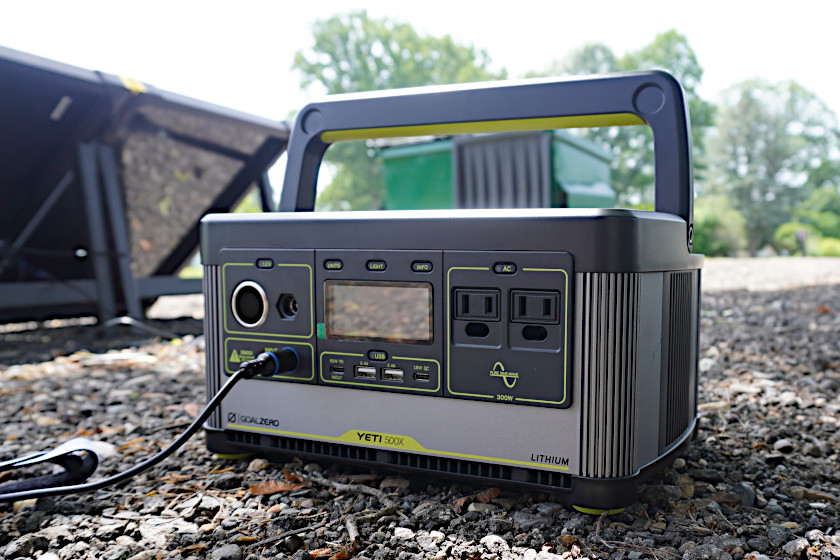
Travis Smola
If you're looking for a power supply that can service a wide range of devices for long periods on camping trips or during an extended power outage, the 500x and Boulder 100 are a great option. This solar generator system has an obvious eco-friendly advantage over traditional gas generators, which means you can use them in campgrounds with noise restrictions as easily as you can inside your house. With the cost of gas getting more expensive, using a battery solution makes a lot of sense. I cannot say how these devices compare to Jackery or any of the other competitors on the market today. However, I will say that after dropping roughly $800 into the full setup seen in these photos, I have zero regrets about my purchase. I like them so much that I've considered picking up either the larger Yeti 1500x or a more compact unit like the Yeti 400 to compliment this one. The quality and functionality are both there, and Goal Zero has won me over as a fan for a long time with these products.
Products featured on Wide Open Spaces are independently selected by our editors. However, when you buy something through our links, we may earn a commission.
For more outdoor content from Travis Smola, be sure to follow him on Twitter and Instagram For original videos, check out his Geocaching and Outdoors with Travis YouTube channels.
